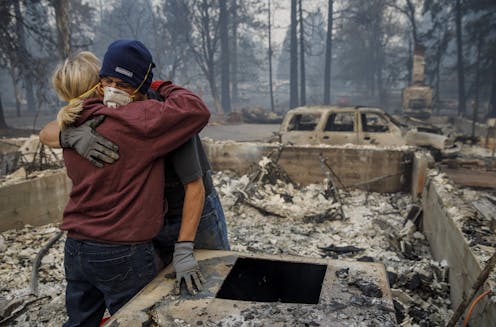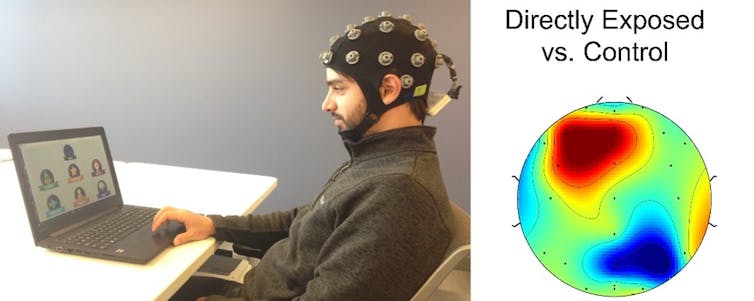Climate change trauma has real impacts on cognition and the brain, wildfire survivors study shows
A new neuropsychology study on California wildfire survivors found chronic cognitive problems in addition to anxiety and PTSD.

The Research Brief is a short take about interesting academic work.
The big idea
Psychological trauma from extreme weather and climate events, such as wildfires, can have long-term impacts on survivors’ brains and cognitive functioning, especially how they process distractions, my team’s new research shows.
Climate change is increasingly affecting people around the world, including through extreme heat, storm damage and life-threatening events like wildfires. In previous research, colleagues and I showed that in the aftermath of the 2018 fire that destroyed the town of Paradise, California, chronic symptoms of post-traumatic stress disorder (PTSD), anxiety and depression were highly prevalent in the affected communities more than six months after the disaster.
We also found a graded effect: People whose homes or families were directly affected by fire showed greater mental health harm than those where who were indirectly effected, meaning people who witnessed the event in their community but did not have a personal loss.
In the new study, published Jan. 18, 2023, our team at the Neural Engineering and Translation Labs, or NEATLabs, at the University of California San Diego, wanted to understand whether the symptoms of climate change-related trauma translate to changes in cognitive functioning – the mental processes involved in memory, learning, thinking and reasoning.
We evaluated subjects’ cognitive functioning across a range of abilities, including attention; response inhibition – the ability to not respond impulsively; working memory – the ability to maintain information in mind for short periods of time; and interference processing – the ability to ignore distractions. We also measured their brain function while they performed cognitive tasks, using brain wave recordings obtained from electroencephalography, or EEG.

The study included three groups of individuals: people who were directly exposed to the fire, people who were indirectly exposed, and a control group with no exposure. The groups were well matched for age and gender.
We found that both groups of people exposed to the fire, either directly or indirectly, dealt with distractions less accurately than the control group.
We also found differences in the brain processes underlying these cognitive differences. People who were exposed to the wildfire had greater frontal lobe activity while dealing with distractions. The frontal lobe is the center for the brain’s higher-level functions. Frontal brain activity can be a marker for cognitive effort, suggesting that people exposed to the fires may be having more difficulty processing distractions and compensating by exerting more effort.
Why it matters
With climate change fueling more disasters, it is incredibly important to understand its impacts on human health, including mental health. Resilient mental health is what allows us to recover from traumatic experiences. How humans experience and mentally deal with climate catastrophes sets the stage for our future lives.
There are strategies people can use to help reduce the stress. Psychosocial research suggests that practicing mindfulness and developing healthy lifestyles, with regular exercise and enough sleep, can protect mental well-being in these scenarios, along with developing strong social bonds.
What’s next?
There is much work to be done to understand if the effects we found are replicable in large sample studies. In this work, we focused on a total of 75 study participants. Scientists also need to understand how these effects evolve as climate disasters like wildfires occur more often.
We are also pursuing research with community partners to implement interventions that can help alleviate some the impacts we observed on brain and cognitive functioning. There is no one-size-fits-all solution – each community must find the resiliency solutions that work best in their environmental context. As scientists, we can help them understand the causes and point them to solutions that are most effective in improving human health.
Jyoti Mishra received funding from the Tang Prize Foundation for this research. She is director of the NEATLabs at University of California (UC) San Diego and the Co-director of the UC Climate Change and Mental Health Initiative at the UC Center for Climate, Health and Equity.
Read These Next
Iran will respond to US-Israeli strikes as existential threats to the regime – because they are
The latest attack on Iran goes far beyond previous operations by Israel and the US in both scale and…
Cuba’s speedboat shootout recalls long history of exile groups engaged in covert ops aimed at regime
From the 1960s onward, dissident Cubans in exile have sought to undermine the government in Havana −…
Drug company ads are easy to blame for misleading patients and raising costs, but research shows the
Officials and policymakers say direct-to-consumer drug advertising encourages patients to seek treatments…





